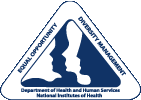NIH Special Emphasis Programs & Annual Observances
January
Dr. Martin Luther King, Jr. Observance
OEODM Contact: Michael Chew
Commemoration of Dr. Martin Luther King, Jr.'s birthday, emphasizing
his ideals for a colorblind society through speeches, dance, songs,
and skits; usually held prior to the National Holiday; televised
to NIH locations on and off campus.
February
African American History Month
OEODM Contact: Charly Wells
Program or activity on campus commemorating African Americans' past
and present contributions to America; panels and speeches; may also
highlight a particular concern of African Americans, e.g., bone
marrow donations; adoption of African American children.
March
Women's History Month
OEODM Contact: Molly Gleeson
Program or activity on campus commemorating women's past and present
contributions; presentations addressing present-day concerns of women;
activities to sensitize both women and men to issues such as pay equity,
glass ceiling, and balancing family and work life.
Deaf Awareness Program
OEODM Contact: Gary Morin
The NIH Deaf Employees Advisory Forum (DEAF) is an employee organization
that addresses the concerns of the Deaf and Hard-of-Hearing employees
in the work environment. The DEAF members take the lead in planning
a biannual Deaf Awareness Program for the NIH community, consisting
of speakers, panelists, and dramatizations.
April
Take Your Child To Work
OEODM Contact: Gary Morin
Though ordinarily announced as Take Your Daughter To Work,
the NIH elected to sponsor activities for children (ages 9 to 15
years old) whose parents work at NIH. Activities provide children
an opportunity to learn of the contributions parents make to the
general health of the country, the roles they play in accomplishing
the NIH mission, and opportunities to learn new career ideas through
talks, tours, and demonstrations.
May
Asian American/Pacific Islander Heritage Month
OEODM Contact: Charly Wells
Program or activity on campus commemorating Asian American/Pacific
Islander's past and present contributions through music and dances;
a noontime
luncheon where Asian vendors are present with Asian food and other
events focused on topics that expose participants to Asian American/Pacific
Islander cultures.
June
Gay and Lesbian
Awareness Month
OEODM Contact: Michael Chew
The NIH Gay and Lesbian Employee Forum (GLEF) sponsors educational
sessions to promote awareness of issues, such as employment discrimination,
domestic partner benefits, and barriers to healthcare.
September/October
Hispanic Heritage Month
OEODM Contact: Pedro Morales (Acting)
Program activity on campus commemorating Hispanics' past and present
contributions; presenters and panelists lecture on current subjects,
particularly in areas of science and medicine. Cultural activities
promote awareness of Hispanic music, dance, and food.
November
American Indian/Alaska Native Heritage Month
OEODM Contact: Michael Chew
Program or activity commemorating Native Americans' past and present
contributions. The NIH supports the interagency heritage and awareness
program, sponsored by the Indian Health Service, usually held at
the Parklawn Building. The annual program features speakers on topics
of concern to Native Americans such as healthcare, diseases, and
employment opportunities.
Disability Employment Awareness Month
OEODM Contact: Carlton
Coleman
Program or activity on campus commemorating past and present contributions
of persons with disabilities; education and awareness activities bring
attention to the problems that confront persons with disabilities
and make able-bodied persons more aware of abilities rather than disabilities.
Program may consist of educational presentations and demonstrations
of reasonable accommodation equipment and other assistive devices.
|





